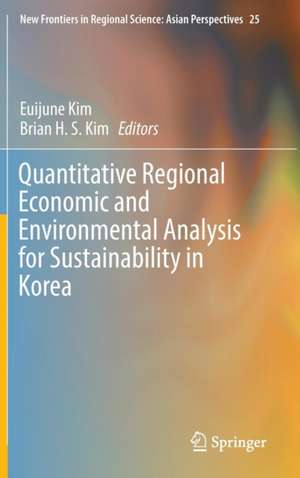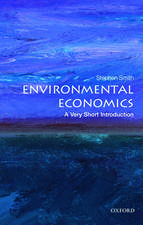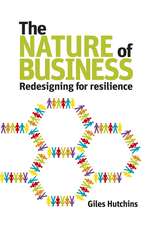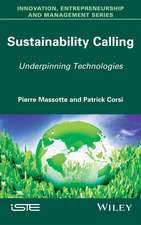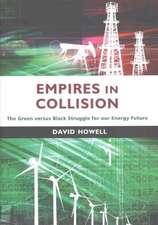Quantitative Regional Economic and Environmental Analysis for Sustainability in Korea: New Frontiers in Regional Science: Asian Perspectives, cartea 25
Editat de Euijune Kim, Brian H. S. Kimen Limba Engleză Hardback – 15 noi 2016
| Toate formatele și edițiile | Preț | Express |
|---|---|---|
| Paperback (1) | 638.43 lei 6-8 săpt. | |
| Springer Nature Singapore – 29 iun 2018 | 638.43 lei 6-8 săpt. | |
| Hardback (1) | 644.63 lei 6-8 săpt. | |
| Springer Nature Singapore – 15 noi 2016 | 644.63 lei 6-8 săpt. |
Din seria New Frontiers in Regional Science: Asian Perspectives
- 15%
 Preț: 652.64 lei
Preț: 652.64 lei - 18%
 Preț: 742.00 lei
Preț: 742.00 lei - 15%
 Preț: 645.96 lei
Preț: 645.96 lei - 18%
 Preț: 798.18 lei
Preț: 798.18 lei - 18%
 Preț: 728.74 lei
Preț: 728.74 lei - 18%
 Preț: 724.14 lei
Preț: 724.14 lei - 18%
 Preț: 733.33 lei
Preț: 733.33 lei - 15%
 Preț: 693.25 lei
Preț: 693.25 lei - 15%
 Preț: 640.06 lei
Preț: 640.06 lei - 15%
 Preț: 702.87 lei
Preț: 702.87 lei - 15%
 Preț: 718.61 lei
Preț: 718.61 lei - 18%
 Preț: 786.36 lei
Preț: 786.36 lei - 18%
 Preț: 1110.72 lei
Preț: 1110.72 lei - 15%
 Preț: 644.18 lei
Preț: 644.18 lei - 18%
 Preț: 787.78 lei
Preț: 787.78 lei - 15%
 Preț: 699.45 lei
Preț: 699.45 lei - 18%
 Preț: 897.47 lei
Preț: 897.47 lei - 15%
 Preț: 643.34 lei
Preț: 643.34 lei -
 Preț: 395.25 lei
Preț: 395.25 lei - 18%
 Preț: 892.42 lei
Preț: 892.42 lei -
 Preț: 386.39 lei
Preț: 386.39 lei - 24%
 Preț: 594.43 lei
Preț: 594.43 lei - 18%
 Preț: 900.31 lei
Preț: 900.31 lei - 15%
 Preț: 714.02 lei
Preț: 714.02 lei - 15%
 Preț: 698.62 lei
Preț: 698.62 lei - 24%
 Preț: 632.82 lei
Preț: 632.82 lei - 18%
 Preț: 1244.59 lei
Preț: 1244.59 lei - 18%
 Preț: 785.42 lei
Preț: 785.42 lei - 15%
 Preț: 639.73 lei
Preț: 639.73 lei -
 Preț: 357.81 lei
Preț: 357.81 lei - 18%
 Preț: 1111.53 lei
Preț: 1111.53 lei - 18%
 Preț: 721.33 lei
Preț: 721.33 lei
Preț: 644.63 lei
Preț vechi: 758.38 lei
-15% Nou
Puncte Express: 967
Preț estimativ în valută:
123.35€ • 131.90$ • 102.85£
123.35€ • 131.90$ • 102.85£
Carte tipărită la comandă
Livrare economică 18 aprilie-02 mai
Preluare comenzi: 021 569.72.76
Specificații
ISBN-13: 9789811002984
ISBN-10: 9811002983
Pagini: 291
Ilustrații: X, 243 p. 42 illus., 14 illus. in color.
Dimensiuni: 155 x 235 x 16 mm
Greutate: 0.54 kg
Ediția:1st ed. 2016
Editura: Springer Nature Singapore
Colecția Springer
Seria New Frontiers in Regional Science: Asian Perspectives
Locul publicării:Singapore, Singapore
ISBN-10: 9811002983
Pagini: 291
Ilustrații: X, 243 p. 42 illus., 14 illus. in color.
Dimensiuni: 155 x 235 x 16 mm
Greutate: 0.54 kg
Ediția:1st ed. 2016
Editura: Springer Nature Singapore
Colecția Springer
Seria New Frontiers in Regional Science: Asian Perspectives
Locul publicării:Singapore, Singapore
Public țintă
ResearchCuprins
Part 1. Sustainability and Regional labor Market.- 1. The Role of Cities in Sustainability Transitions: New Perspectives for Science and Policy.- 2. Exploring the Geography of Educational Segregation in Seoul, Korea.- 3. Labor Market Distortion with Discouraged Worker Effects in Korea.- Part 2. Industrial Agglomeration and Regional Policies.- 4Innovation of ICT Manufacturing and Agglomeration Economies: Evolution over the Life Cycle.- 5. Spatial Agglomeration and Firm Performance.- 6. Impact of Local Government Monetary and Fiscal Policies on Output Growth of Firms.- Part 3. Disaster and Impact Analysis.- 7. Assessment of Community Vulnerability to Natural Disasters in Korea by using GIS and Machine Learning Techniques.- 8.Indirect Impact of Nuclear Power Plant Accidents Using an Integrated Spatial Computable-General Equilibrium Model with a Microsimulation Module on the Korean Transportation Network.- 9. A New Framework to Quantifying the Economic Impacts of Cyber-Attacks on Aviation Systems: A Korean Game-Theoretic Interregional Economic Model.- Part 4. Environmental Sustainability and Policies.- 10. Effects of Urban Spatial structure on Travel Behavior and Transportation Energy Efficiency in Korea.- 11. Need for Coordination between Greenhouse Gas and Pollution Abatement Regulations: China’s Case and Its Implications for Korea.- 12. Effects of the Project Investments and Valuation of the Water Quality Improvement of the River Taehwa in Ulsan, Korea.- 13. Trade and Environmental Responsibility for Greenhouse Gas Emissions: The Case of South Korea.
Notă biografică
Euijune Kim is a Professor in the Department of Agricultural Economics and Rural Development, Seoul National University. He received his PhD in Regional Science at Cornell University in 1991. He specializes in the areas of Regional Economics, Infrastructure Policy, and CGE modelling. He has received numerous awards with his extensive research publications in journals, research monographs and edited volumes. He also served as an editor for several journals, including the Annals of Regional Science and International Journal of Urban Sciences and as the President of the Korean Regional Science Association.
Brian Hong Sok Kim is a Professor in the Department of Agricultural Economics and Rural Development, Seoul National University. He received his PhD in Regional Science at Cornell University in 2003. He specializes in the areas of Sustainable Regional Development, Environment Economics, Economic Valuation, Agricultural and Environmental Risk Assessment, andEconometric Theory and Application. He has published numerous research articles, in both English and Korean, at highly ranked scholarly journals. He currently serves as an associate editor at International Journal of Urban Science and vice president at the Korean Regional Science Association and the Korean Society of Rural Planning.
Textul de pe ultima copertă
This book focuses on the application of newly innovated analytical tools for sustainable development on regional economic and environmental issues in Korea. With a range of case studies, the authors explore a series of theoretical models and empirical methods including spatial CCE Model, multiregional Input-Output and econometric analysis, logit model, contingent valuation method, GIS, sample selection model, machine learning technique, stochastic frontier analysis, and panel analysis. These models and methods are tailored to spatial development issues such as agglomeration, clustering and industrial innovation, human capital and labor market, education and R&D investments and economic resilience for regional economies and unexpected disaster, and natural resources for environmental markets. Quantitative Regional Economic and Environmental Analysis for Sustainability in Korea is of particular interest to policy makers and practitioners, as well as research scholars active in sustainability science.
Caracteristici
Introduces a series of theoretical models and empirical methods for applications in regional and environmental development, as well as management towards sustainability Provides various case studies from multiple disciplines that highlight regional economic development, innovation, environment and disaster management. Features how Korea, one of the most rapidly developed economies in recent times, adapts sustainability issues in various sectors of their system
